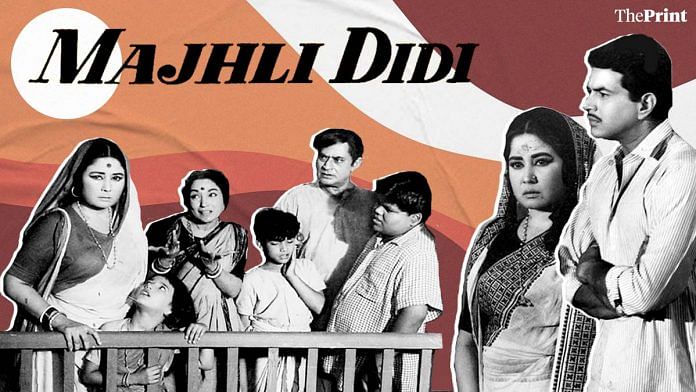There is a scene in Hrishikesh Mukherjee’s 1967 movie Majhli Didi in which two sisters-in-law, Kadambini (Lalita Pawar) and Hemangini (Meena Kumari) are arguing with each other, full-throatedly and in full public view.
Two things stand out here. One, that these are two women who know perfectly well that they are creating a spectacle, and behaving in a way that would most certainly invite not only gossip, but also censure from others, for being unladylike — but that isn’t stopping them. The second is that despite being the younger of the two and expected to defer to her Didi, Hemangini has no qualms calling out Kadambini for her various flaws.
These are not women who conform to every expectation, but then, this is a movie based on a novel (Mejdidi) by Sarat Chandra Chattopadhyay, the legendary Bengali author whose works were known to feature strong, outspoken female characters, many of which were adapted for the screen.
In the week of the author’s birth anniversary, here is a look back at Majhli Didi.
Also read: Pakeezah is that rare film whose making is as much of a story as the actual plot
The battle between family, justice and love
Hemangini, Kadambini and their respective husbands, brothers Bipin (Dharmendra) and Naveen (Bipin Gupta), live together in what is anything but a happy family. Hemangini is a city-bred woman whose urban ways and tendency to speak truth to power cause Kadambini and Naveen major heartburn. Her only support comes from her own husband, Bipin, who, though under his older brother’s thumb, does speak up in support of his wife.
Kadambini, a shrill woman who delights in playing family politics, is insecure about Hemangini’s urban upbringing and constantly tells anyone who will listen that she herself came from a big, wealthy household and has really come down in life by now living in this village after marriage.
Even the four children of the house aren’t spared the politics, as Kadambini constantly tries to prove that Hemangini is only nice to her own children, but treats her niece and nephew badly, although that is patently untrue.
Things come to a head when Naveen, who runs a clothing shop, tries to cheat a poor man by claiming he has not returned the Rs 500 he owed Naveen. Both Bipin and Hemangini know this is a lie, as Bipin himself gave the man the last few rupees he needed, and even warned him to get a receipt. Naveen didn’t give him one, and he is angry that the old man was able to return the money, because if he hadn’t, Naveen would have been able to take his land.
Naveen decides to take the old man to court, but the defence has a surprise witness, Hemangini, who testifies against her own brother-in-law. Her act enrages not only Naveen and Kadambini, but even the kind-hearted and mild-mannered Bipin. Still, when he stands up for her, Naveen throws the two out of the house. Even after they move next door with their children, Hemangini does try to keep up with the older couple, but her sister-in-law will have none of it.
Meanwhile, Kadambini’s stepbrother, a sweet young child named Kishan, comes to stay with her after his mother (Leela Chitnis) dies. Kadambini, his only living relative, despises and abuses him, treating him like domestic staff, sending him out to work instead of school, and even starving him.
He finds comfort in Hemangini’s home, where he goes often, for food and a dose of love (there is a lovely scene when she puts a teeka on him on Bhai Dooj, even though his actual stepsister wouldn’t even think of it), but that is a blow to Kadambini’s ego, even though she wants nothing to do with the boy. What follows is a family drama about what family really is, and if it really matters that one is not related by blood.
The movie also raises questions about what a woman’s identity is, especially after she is married. Its title, Majhli Didi, for example, is an odd choice, given that she is only the middle sister of her own family; after marriage, she is called Chhoti Bahu (younger daughter-in-law), clearly giving her a new, lower designation. And towards the end, she tells Bipin that she is more than just a bahu, she is a person, a mother, and she cannot tolerate injustice.
It’s a lovely, powerful scene, made all the more powerful for the firm, calm composure with which Meena Kumari plays it. While most remember the ‘tragedy queen’ for her career-defining Pakeezah, Majhli Didi ranks right up there as one of her finest roles and performances.
Also read: Rajesh Khanna’s Safar is a melancholy meditation on life, death, love and duty



